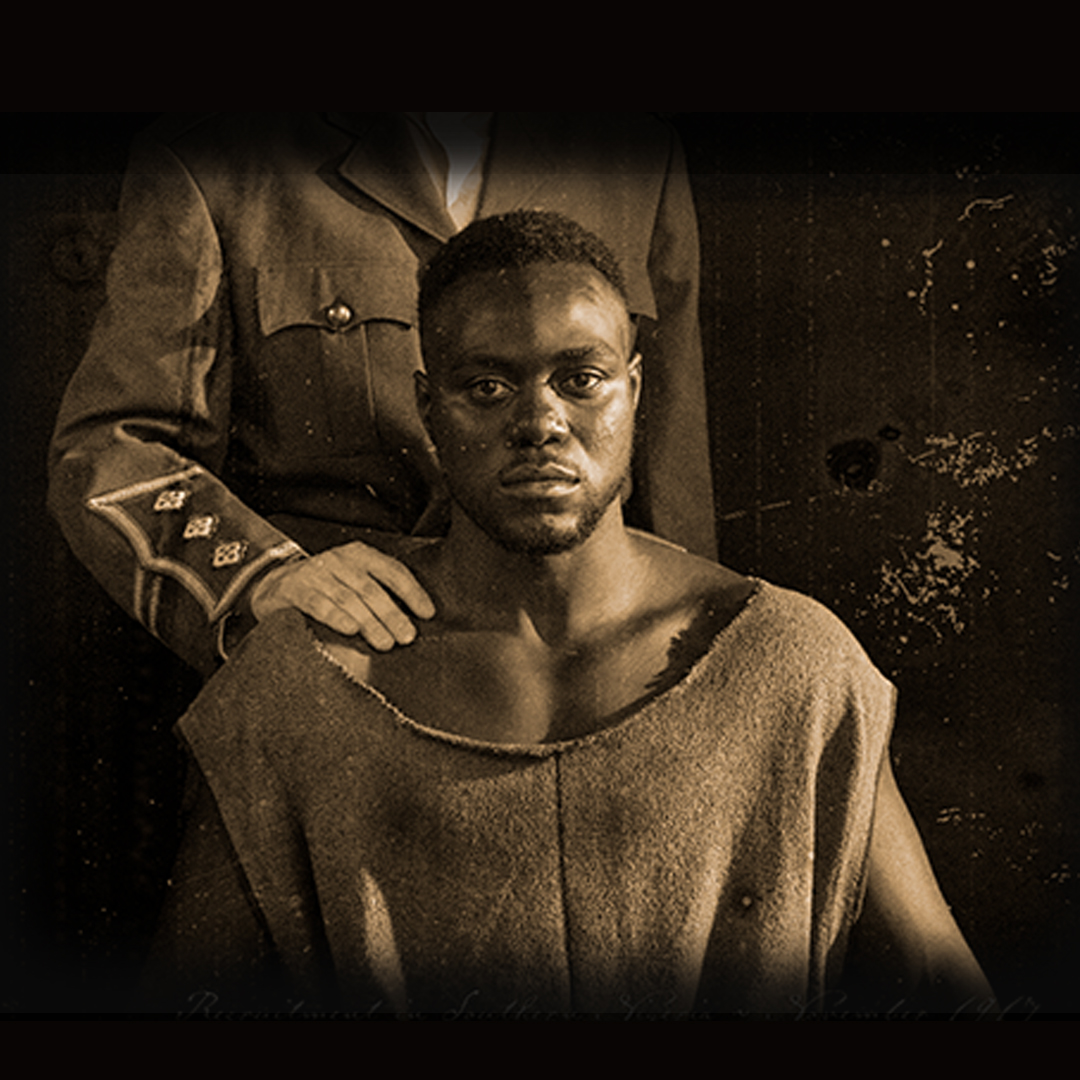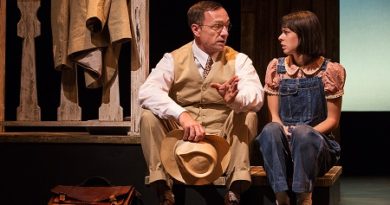Vincent Deiulis whets our appetite for delayed WWI drama GODS LIKE US

As we proceed through this pandemic time of lockdowns, cancellations and closures, artists have remained remarkably resilient. Theatre Nidāna’s Vince Deiulis was well into rehearsals of his duo play Gods Like Us when the live arts were forced to a halt. The company was readying for this year’s RISER Project in a “double bill” of sorts with Himanshu Sitlani and Neha Poduval’s An IMM-Permanent Resident. (RISER is a collaborative producing model developed by Why Not Theatre in 2013 for theatre artists and companies to create and present new work in Toronto.)
Deiulis co-wrote, co-produced and co-acts in Gods Like Us, alongside Zazu Oke. His biggest concern now is less the postponement of this show, into which he has poured two years of his life, than when and how the Canadian economy will restabilize, and what the lasting effects may be on artists in Canada and around the world. Nonetheless, he remains confident that “theatre will always exist in varying forms”. And he is optimistic that artists will “weather this storm, as we have in times before this and in the years that will follow.”
But in the meantime, after a long gestation, Gods Like Us must wait still longer for restrictions on public gatherings to lift. The play’s genesis lies in 2017, when Deiulis performed in Echoes of the War, an adaptation of J.M. Barrie’s set of short plays about U.K. families during the First World War. Deiulis did a fair amount of research on both WWI and J.M. Barrie to prepare for that production. To aid with his research, Deiulis’ uncle leant him The World’s War, a “fantastic” non-fiction book by British-Nigerian author/historian David Olusoga. Deiulis’ pointed synopsis of the book describes it as “a unique account of colonial troops who fought in World War I, and why they were later air-brushed out of history.”
Reading this book, and knowing that November 2018 marked the Centenary of the WWI Armistice, Deiulis reached out to friend and fellow performer Zazu Oke to ask what he knew about Nigeria’s involvement in World War One. Oke didn’t know much beyond the fact that Nigeria was a British colony during WWI. Deiulis wondered if Oke would be interested in looking into Nigeria’s history and presenting something on the Armistice Centenary in November 2018 to educate a Canadian audience about the “untold contribution of Nigeria that made that war a truly global conflict”. Oke agreed, and the two began their research.
Their research included Oke reaching out to family in both Nigeria and Canada to ask what they knew, while Deiulis unearthed every piece of information he could find at the Toronto Reference Library. The “biggest shock” to both was the sheer number of Nigerians who contributed directly or indirectly to the war effort, and how greatly World War I impacted Nigeria’s growth as a colony, and later as a nation. Quickly, “it became important to us to share the untold stories of so many families with a modern, Canadian audience.”
This is a hundred-year-old story, which Canadian audiences will know little to nothing about. So making it relevant and important today is one of the co-creators’ most difficult tasks. This led to their “initial instinct . . . to bring in a Canadian character so that members of the audience could have someone to relate to.” The play centres on the journey of the Farmer on his yam field in Nigeria, but presents audiences with the familiar through the Farmer’s interaction with a Canadian Recruiter suffering “shell shock” or Post-Traumatic Stress Disorder from his time at war. Through the Farmer, the audience is introduced to the Nigerian local customs, traditions and expressions.
In the 2018 workshop, Oke researched and sang a lullaby that he learned as a child in Nigeria, and which was familiar to members of the audience. At one point in that production, he took out some sugar cane and began chewing it, which again tied in Nigeria-specific elements that became touchstones for members of the audience. However, to ensure that the story remained relevant to Canadians, the Recruiter also shared stories of his past growing up with a missionary father in Canada and eventually joining the war to fight for Canada. Audience feedback indicated that the duo had hit on something compelling: “they were fascinated to see these two vastly different characters challenge each other’s perceptions of morality in a time of war, while also raising historical issues they felt they wished they knew. Reviewers from that initial workshop in 2018 remarked how important they felt learning these different perspectives of history were in providing a fuller picture of our collective, global history.”
In preparation for RISER 2020, Why Not Theatre provided Theatre Nidāna many opportunities that might have not been otherwise available. Before COVID-19, the company had completed two out of the three weeks of rehearsal, and had finalized the script. They had received guidance and mentorship not only from Why Not, but also from Nina Lee Aquino, Artistic Director of Factory Theatre, who served as their “outsidest eye”, as well as director Majdi Bou-Matar. “I am forever thankful to these two amazing human beings who elevated our work over the first two weeks of March. We were very excited to share a very different, but fundamentally similar, Gods Like Us in April. Our amazing design team Wes Babcock (Scenic Design), Rebecca Vandevelde (Lighting Design) and composer/musician Genna Giampaolo were working diligently to bring the stunning production elements to life for our eventual RISER 2020 audience.”

When the company one day returns to the project, Deiulis’ simple hope is for audiences to be transported to a yam field in Nigeria once again to “join a reluctant Farmer propositioned by a damaged Recruiter – to bring the untold story of African sacrifice and resilience to life”. He also hopes that seeing the eventual production will inspire people to “discover more of the world history than what is written in our Canadian history textbooks”.
On a personal note, his research has yielded insights and questions that extend well beyond Nigerian involvement in World War I. It has aroused a deep curiosity to learn more about how different cultures suffered and healed post-World War I, and how that intergenerational trauma affected these communities, even down into today. In this light, he can envision himself one day involved in a “massive project employing artists and advisors from varying cultural backgrounds all collaborating on a project that speaks about how we heal, or attempt to heal, the wounds inflicted by major world-wide conflicts”. This collaborative aspiration is informed in part by his great admiration for his fellow artists: he is “constantly in awe of the work done in this city, and country, by our cultural leaders and institutions.”
In the meantime as the pandemic plays out, Deiulis will be patient, finding solace in simple truths. “It is a very uncertain time, and many folks are turning their quarantine time into an opportunity to take in more art,” he notes. Deiulis, an avid reader, is doing the same – devouring everything from articles to legislation to works of fiction. “I have always found refuge in reading.”
Refuge . . . and arresting ideas that he will once again soon be able to bring to our stages.
News You Can Use
What: Gods Like Us by Vince Deiulis and Zazu Oke | Scenic Design: Wes Babcock | Lighting Design: Rebecca Vandevelde | composer/musician: Genna Giampaolo | Dramaturgy: Tawiah Ben M’Carthy | Director: Majdi Bou-Matar
Info: theatrenidana.com
© Arpita Ghosal, SesayArts Magazine, 2020
About The Author
Arpita Ghosal
Arpita Ghosal is a Toronto-based arts writer. She founded Sesaya in 2004 and SesayArts Magazine in 2012.
Visit About Us > Meet the Team to read Arpita’s full bio …



